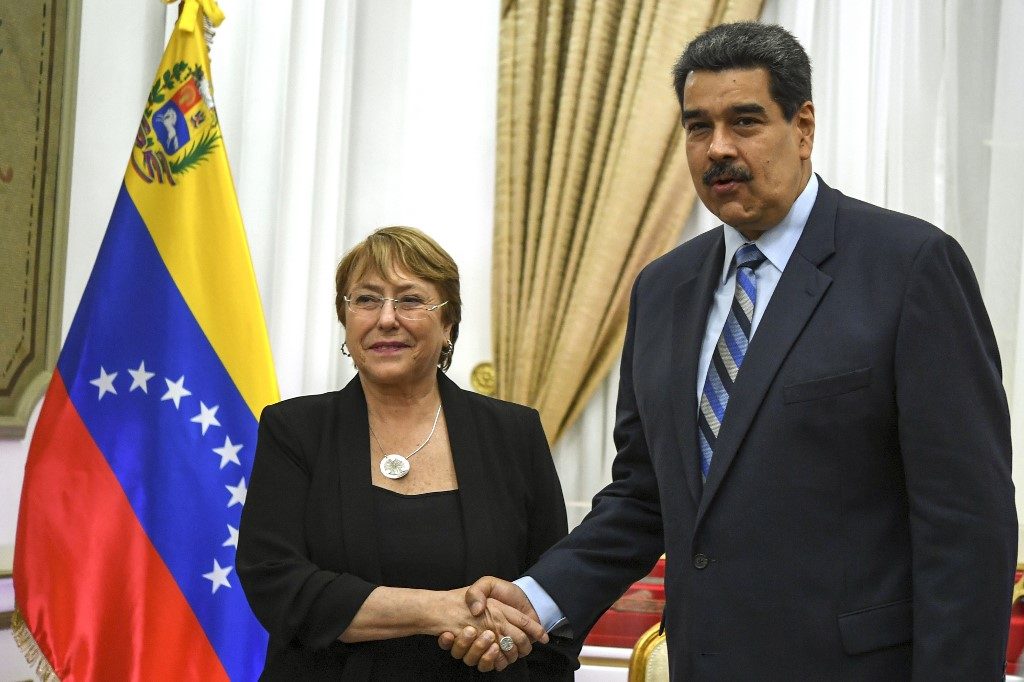SUMMARY
This is AI generated summarization, which may have errors. For context, always refer to the full article.

MANILA, Philippines – The United Nations human rights office led by its High Commissioner Michelle Bachelet is expected to initiate a comprehensive review of the situation in the Philippines any time now.
The UN Human Rights Council (UNHRC) in a resolution adopted on July 11 urged Bachelet and her team to come up with a written report on the rising killings in the country, including those under President Rodrigo Duterte’s war on drugs.
She is expected to present the report before the council during the UNHRC’s 44th Session in 2020.
The Philippines isn’t the first country to be subjected to such review. Just in September 2018, the UNHRC during its 39th Session adopted a resolution which, among others, requested the UN rights office of Bachelet to prepare a comprehensive written report on Venezuela.
As the Philippines waits for the start of the review and the government’s further action, Rappler takes a look at how the UN rights office handled its Venezuela report.
How did the UN rights team do the review?
The review was conducted amid political turmoil in Venezuela starting January 2019 when National Assembly speaker Juan Guaido declared himself acting president, challenging President Nicolas Maduro’s authority.
A total of 27 countries voted to adopt the resolution. The Philippines abstained.
Producing the report entailed interviewing at least 558 victims and witnesses of human rights violations which occurred from January 2018 to May 2019. The team also conducted 159 meetings and talked to various sources, including government officials and civil society organizations.
The UN human rights office sent a team to Venezuela for 11 days in March 2019. Between September 2018 and 2019, they also conducted 9 visits to Venezuelan refugees and migrants in other countries as facilitated by their respective governments: Argentina, Brazil, Chile, Colombia, Ecuador, Mexico, Peru, and Spain.
Bachelet herself visited Venezuela from June 19 to 21 in 2019 and met with several key officials, including Maduro, as well as victims and their families. During the 40th UNHRC Session, she said that she “was able to hear first-hand the accounts of victims of State violence and their demands for justice.”
Their visits to the country-subject of the review, Bachelet said, was the first-ever official mission by any UN High Commissioner for Human Rights to Venezuela. For all the accusations against Venezuela, she expressed appreciation for the government which invited and cooperated with the UN missions, as well as provided needed documents.
The conduct for the 2019 report was different from when the UN rights office wrote a previous report in 2018 in which the government barred access to Venezuela. Because of this, the office was able to conduct “remote monitoring” only.
Bachelet’s visit to Venezuela was met with pleadings from various human rights organizations and citizens for help.

What did the UN rights office find out?
Bachelet’s office published its report on the Venezuela situation on July 4, 2019, detailing the shrinking democratic space, militarization of government institutions, arbitrary detentions and torture of government critics and their families, and excessive use of force of both civil and military forces, among others.
The UN human rights office also documented 66 deaths during protests – these were attributed to government security forces – while 793 remain in detention. It also discovered that according to government records, 5,287 killings in 2018 were carried out by State Action Forces (SAF) for “resistance to authority” but other interviewed sources suggested a higher count.
“There are reasonable grounds to believe that many of these killings constitute extrajudicial executions committed by the security forces,” the report stated.
The report, in conclusion, urged the Venezuelan government to “take immediate, concrete measures to halt and remedy the grave violations of economic, social, civil, political and cultural rights documented in the country.”
It also warned that if it is not addressed, there would be an “unprecedented outflow” of Venezuelan migrants and refugees.
How did Venezuela react to the report?
Maduro, in a letter published July 11, rejected the report as being “fraught with false statements, distortions, and manipulation of data and sources.”
He accused the UN rights office of siding with people who harm Venezuelans and injuring the truth about the situation.
“We condemn its content and demand that your Office immediately rectifies and corrects the grave mistakes, false accusations, and omissions, that turns it into a dangerous step towards an intervention in Venezuela, promotes the impunity of an opposition that trivializes its disregard of life and fosters coups d’état, assassination attempts, violence and destabilization,” he wrote to Bachelet.
Despite objection to the findings, the Venezuelan government released 22 political prisoners on the same day the report was published.
What happens now?
Bachelet is expected to present the report to the UN Human Rights Council, which, in turn, will initiate a dialogue on the findings.
“I call on all those with the power and influence – within Venezuela and elsewhere – to work together, and to make the necessary compromises to resolve this all-consuming crisis,” Bachelet said.
“My Office stands ready to continue doing its part.” – Rappler.com
Add a comment
How does this make you feel?
There are no comments yet. Add your comment to start the conversation.